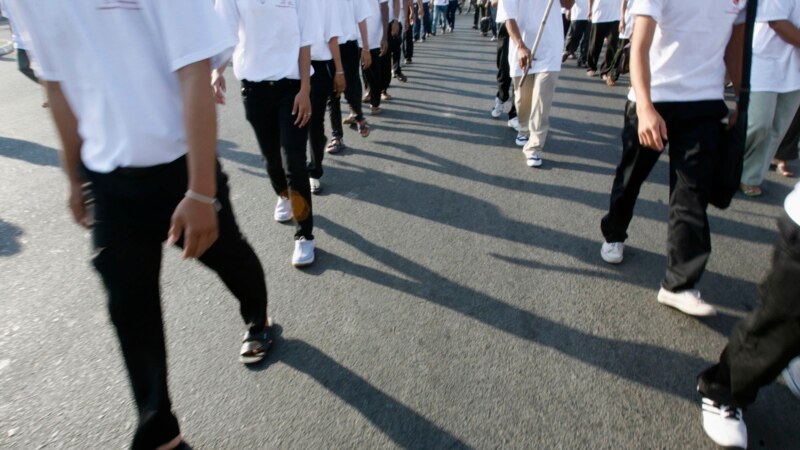
The Swedish government will phase out bilateral development cooperation with Cambodia by the end of this year, raising concerns among civil society groups likely to see their budgets shrink.
In 2023, the Swedish government provided about $17 million to civil society groups in Cambodia focusing on strengthening human rights, democracy and the rule of law, according to data from the Swedish International Development Cooperation Agency (SIDA).
The Swedish Ministry for Foreign Affairs pointed to the war in Ukraine as forcing the country to refocus its foreign aid when it made the announcement in December, but the decision comes as Western donors have criticized Cambodia’s democratic backsliding over the past decade.
“The Swedish government wants Sweden’s development assistance to be used as effectively as possible, and that it is used where it does the most good. Limited resources and increasing needs abroad mean that the government must set difficult but necessary priorities for Sweden’s development assistance,” the ministry told VOA Khmer in an email in January.
“The Swedish government has therefore decided to phase out our bilateral development cooperation with Cambodia during 2024. The phasing-out of the bilateral development cooperation will be done in a responsible manner, and in dialogue with other donors and partners to minimize negative consequences,” it added.
Pen Bona, a spokesperson for the Cambodian government, played down Sweden’s decision and any potential impact on the Cambodian population.
“They [donors] see and evaluate that Cambodia doesn’t need the NGOs to continue working on [those issues] since the government has worked on that,” Pen Bona said in a phone interview on February 8.
“Some NGOs make bad reports about Cambodia to receive funding,” he added.
A group of 100 civil society associations — including communities, unions, youth networks and media organizations — wrote a letter to Swedish Prime Minister Ulf Kristersson, saying they were “seriously concerned” about the announcement.
The decision, the Cambodian civil society groups said, “will have an immediate and devastating impact on civil society organizations and other nongovernmental entities that have stringent labor and other legal obligations to their staff members and the Cambodians they serve,” read the letter, dated January 18, obtained by VOA Khmer.
The letter said the decision to phase out funding would affect more than 30 organizations and multilateral institutions that rely directly or indirectly on this support and would be “detrimental to tens of thousands of Cambodians who look to Sweden as a reliable partner in the promotion of human rights, democracy, gender equality, youth empowerment and rule of law.”
The groups called on the Swedish government to reconsider the decision or give the NGOs more time to find alternate funding sources.
“Sweden’s decision to phase out SIDA funding for Cambodia will also leave a vacuum in the country that will be filled by geopolitical players like China and Russia whose interests may not align with those of Sweden, impacting Sweden’s efforts to strengthen Cambodia’s economic growth,” the groups said.
In a response letter, Diana Janse, state secretary to Johan Forssell, Sweden’s minister for international development cooperation and foreign trade, said Russia’s invasion of Ukraine represents a paradigm shift with extensive political, economic and humanitarian consequences.
“In conjunction to this, the government has decided to reduce the number of countries that we have bilateral development cooperation with — Cambodia regretfully being one of them,” Janse wrote to the NGOs in a letter obtained last week by VOA Khmer.
“We have, as you point out, been a long-term supporter of human rights and democracy in Cambodia. We will therefore do our utmost to ensure a responsible phasing out,” she said.
Effects on women
Sdeung Phearong, executive director of the Banteay Srei Organization, which works on women’s empowerment, told VOA Khmer in a phone interview on February 8 that her organization had received funds from SIDA that account for about 15% to 30% of core funds. The backing has been channeled through an international NGO.
“The decision [to phase out] will impact the women victims who receive assistance from us,” she told VOA Khmer, adding that her organization had received funding from SIDA for more than 10 years.
“It is so immediate,” Sdeung Phearong said, calling on the Swedish government to reconsider or delay the decision until 2025 or 2026 so the NGOs in Cambodia have more time to seek replacement donors.
Pech Pisey, executive director of Transparency International Cambodia, an NGO, said in a phone interview on February 7 that his group would also be affected by the decrease in Swedish funding. Besides the global security needs and challenges, Pech Pisey said, Sweden was facing the reality that “there is no positive change” in fundamental democracy and human rights in Cambodia.
The Swedish government closed its embassy in Phnom Penh and phased out bilateral cooperation with Cambodia in 2021.
“The democratic space in Cambodia has been severely restricted in recent years. This has made it difficult to pursue broad and close cooperation,” Peter Eriksson, then the Swedish minister for international development cooperation, said in November 2020.
The Swedish ministry said on January 25 in an email to VOA Khmer that it would continue to be a strong voice for human rights and democracy in Cambodia through its role in the European Union.
